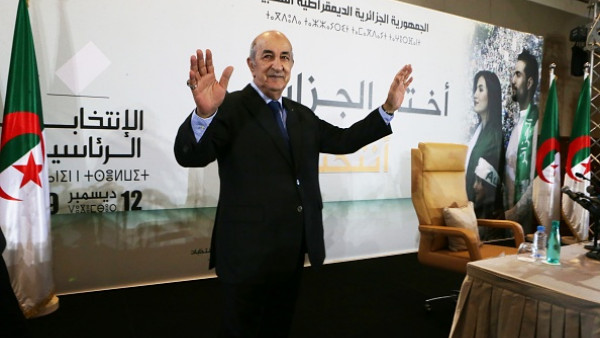“Our problem is with the Moroccan regime, which has historically conspired against us”, said presidential candidate Abdelaali Hassani. [Getty]
In Algeria, presidential candidates have launched their campaigns with social pledges and theories of “foreign threats” in an attempt to gain public support. However, current president Abdelmadjid Tebboune, analysts predict, is likely to retain his position regardless of the outcome of the 7 September elections.
Only two candidates have been approved to challenge President Tebboune: Abdelaali Hassani of the moderate Islamist party, the Movement of Society for Peace (MSP), and Youcef Aouchiche of the centre-left Socialist Forces Front (FFS).
Over the weekend, Hassani began his campaign with warnings about foreign threats targeting Algeria’s security and interests, particularly those from neighbouring Morocco.
“Our problem is with the Moroccan regime, which has historically conspired against us”, Hassani stated on 24 August at a rally in Tlemcen, near the Algerian-Moroccan border. He echoed the state’s official narrative that Rabat’s normalisation with Israel poses a “serious threat to Algeria’s security.” Algeria severed ties with Morocco in 2021 after Rabat joined the Abraham Accords.
“Foreign forces are plotting against the country. The Algerian people are aware of this”, Hassani added, hinting at other unnamed foreign entities.
Since the Hirak movement, which led to the ousting of the Bouteflika regime in 2019, Algerian politicians have frequently cited “foreign threats” to justify the state’s tightening grip on security.
Is Algeria facing foreign threats?
On 14 August, Algeria announced it had thwarted a terrorist attack allegedly involving an Amazigh separatist movement based in France. Local authorities claimed the plot aimed to incite unrest and disrupt the upcoming presidential election on 7 September.
Last year, military figurehead Said Chengriha warned that Algeria is facing extremist attempts to undermine national security and stability. Abdelkader Bengrina, another politician close to the Mouradia palace, echoed these concerns, alleging that an unnamed “Gulf state” was sowing discord in the region and targeting Algeria.
Although these foreign threats have not been officially confirmed, Algeria’s tense regional environment has only fuelled such theories among its populace.
Last month, France and Algeria clashed again over the disputed territory of Western Sahara, with Paris ultimately siding with Rabat. Meanwhile, Algeria maintains strained relations with its neighbour, the Malian junta, and faces an ongoing crisis to the east with Libyan military leader Khalifa Haftar.
“The political use that President Tebboune makes of these crises is more to assert, ‘I am the man for the job’, and to emphasise that Algeria is navigating a highly tense regional context”, said Hasni Abidi, Director of the Centre for Arab and Mediterranean Studies and Research in Geneva, in an interview with Radio France.
In contrast, the Algerian state has banned protests, controlled the press, and dissolved several human rights organisations, including the Algerian League for the Defence of Human Rights (LADDH). The government has used a broad terrorism law and accusations of “foreign interference” to justify these actions.
However, President Tebboune is seeking, if re-elected, social redemption.
Presidential candidates pledge social reformation
Tebboune–who assumed power in 2019 in a low-turnout election–has promised significant social measures, including a potential 100 per cent increase in salaries by 2027 and continued efforts to reduce inflation, which he claims has already dropped from 11 to 6 per cent.
“The same goes for retirement pensions”, Tebboune added during his campaign.
Youcef Aouchiche, representing the pro-Amazigh party FFS which has boycotted elections since 1999, has also proposed a significant increase in the national minimum wage to 40,000 (US$300) dinars and a universal income of 20,000 (US$150) dinars for all social categories. The current minimum wage in Algeria is less than US$150.
For his part, Abdelaali Hassani, the MSP candidate, has pledged to address unemployment and provide competitive opportunities to prevent youth immigration.
However, none of the candidates have addressed the situation of human rights in the country. According to local watchdog groups, over 200 people remain detained in Algerian prisons for expressing dissent since the end of the Hirak movement.
Other opposition parties have boycotted the election, citing unfair conditions. Over social media, several Algerians have vowed to leave the polls empty in protest of the ‘corrupt’ political situation in the country.
Overall, commentators say President Tebboune faces little to no competition for his re-election, with no serious challengers after the disqualification of 13 hopeful candidates. He has also secured the support of the military, which has notoriously played a key role in governing Algeria since its independence.
“The indifference of the Algerian population towards this election also strengthens the likelihood of his [Tebboune’s] re-election”, added political analyst Hasni Abidi.


